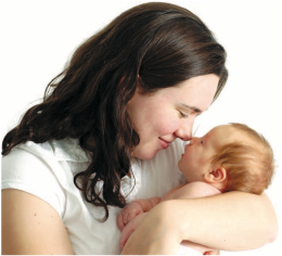After the training you should be able to:
|
Training Content
Introduction and Baby Behavior Background

This module introduces the Secrets of Baby Behavior with an overview of the relationship between infant behavior, infant-feeding practices, and childhood obesity. Next, is a brief summary of the research that formed the basis of the foundation for the development of the Fit WIC Baby Behavior Intervention, including descriptions of infant developmental and behavioral research, barriers to compliance with infant feeding recommendations, and information about making decisions under stress and how it relates to parents’ infant feeding choices. The Fit WIC study design and results are also presented. Finally, trainees will be given 2 fundamental Secrets that apply to all of the infant behavior information in the modules that follow. The information in this training is built on years of research, compiled and presented in a new and unique way.
Infant States and Cues

Characteristics of each of the 6 infant states are described in detail and demonstrated using videos. Trainees will learn how to identify which state an infant is in, how caregiver interaction can help an infant change states, and how feeding is affected by the infant’s state. The 2 types of infant cues are defined, accompanied by video demonstrations. Information about the relationship between infant states and infant cues, understanding infant cues, and clustered cues are also provided. Understanding how an infant responds to his environment and uses cues to communicate can help parents feel more confident that they know what their infant needs. Parental confidence is key to reducing early breastfeeding cessation and formula introduction, overfeeding, and early introduction of solid foods in response to behaviors that do not indicate hunger.
Infant Crying

General overview of infant crying including how babies cry to communicate their distress. This session addresses how crying affects caregivers and drives caregiver action, including feeding. The topic of persistent crying is explored, including reasons for persistent crying and tips to help parents cope without over- or inappropriate feeding. Understanding the many reasons babies cry, other than hunger, and how to respond to infant crying are important tools for parents. Trainees will be able to explain why evolutionarily and biologically babies need to cry and how to use babies’ other cues to decipher the message. They will also be able to answer the question “Is there a hungry cry” and explain how caregivers can help crying babies who’ve already been fed.
Infant Sleep

This module provides a general overview of infant sleep from birth to 6 months of age. Unrealistic expectations about how young babies sleep and how these expectations impact infant feeding will be discussed. Next, the physiology and biology of infant sleep will be presented with an emphasis on infant sleep states, how infant sleep patterns change with age, and how nutritional needs are related to sleep physiology. Trainees will learn the importance of active sleep for growth and development, how active sleep can be mistaken for ineffective feeding, and reasons for excessive waking. Understanding normal sleep states and patterns will help parents feel more confident in caring for their babies.
Infant-Caregiver Interactions

Information about promoting positive parent-infant interactions using the information from the previous 3 modules (States and Cues, Crying, and Sleep) will be presented. Trainees will be given techniques to conduct basic assessments of healthy caregiver-infant interactions, promote positive interactions when the baby is present, and engage, validate, and teach parents information about infant behavior. Using the tools provided, health professionals will see that using the Baby Behavior intervention is a simple and quick way to support the people they serve. Upon completion of this module, trainees will be able to provide basic information to help caregivers recognize and respond to their infants.
Newborn Behavior

This module covers newborn-specific behavior information. Results from a focus group study, conducted by the UC Davis Human Lactation Center, revealed that mothers often have unrealistic expectations about their newborns’ behavior and, when overwhelmed by their experience, may begin supplementing with formula despite the intention to exclusively breastfeed. This module covers parental expectations versus typical behavior on days 1, 2, and 3, newborn cues, crying, and sleep, and tips for helping caregivers cope with stress during the early postpartum period. Research about timing of milk onset and changes in volume over time, problems associated with early initiation of formula, and breast refusal due to infant overstimulation will also be covered. Using the information provided, trainees will have new and innovative tools to promote exclusive breastfeeding and positive parent-infant interactions in the first 72 hours after birth.

